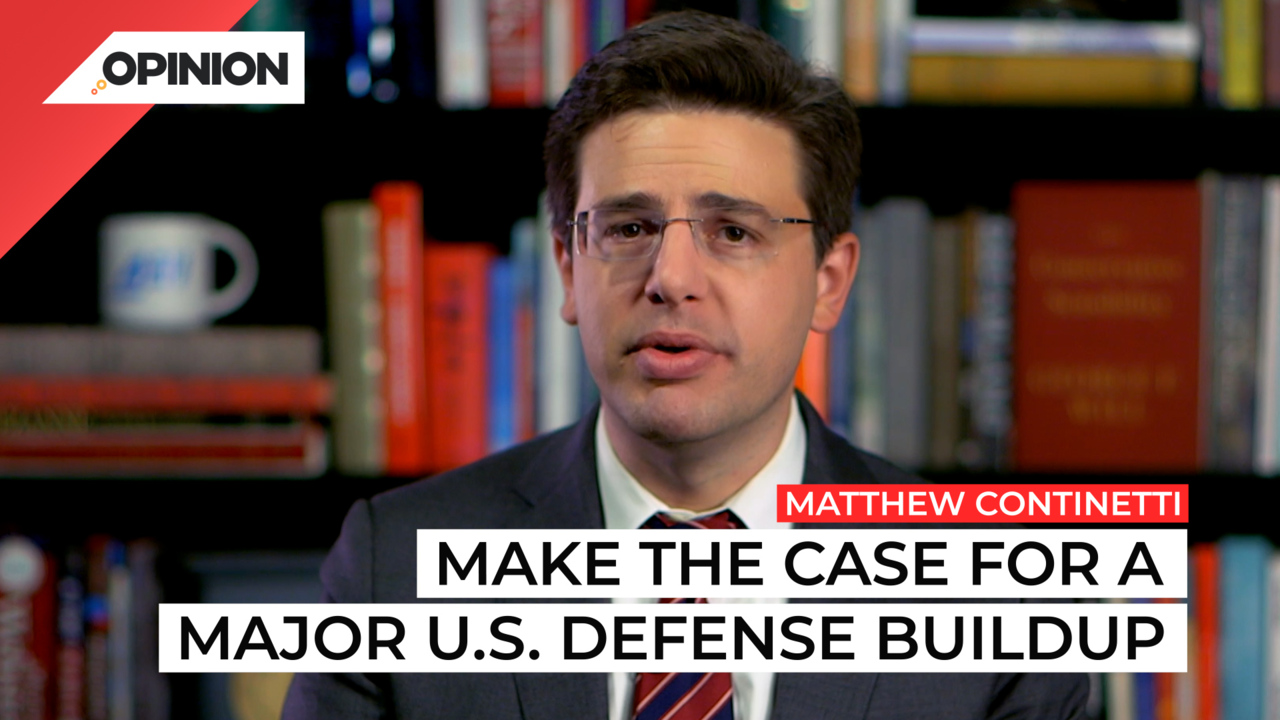
Commentary
-
Our commentary partners will help you reach your own conclusions on complex topics.
War was in the background of President Biden’s recent trip to Asia.
He redeployed U.S. forces to Somalia before he left. He signed into law $40 billion in assistance to Ukraine during his visit to South Korea. Then, in Japan, a reporter asked Biden if he was prepared to “get involved militarily to defend Taiwan.” Biden’s answer was succinct. “Yes,” he said.
Leave aside the question of whether the United States should move from a policy of strategic ambiguity, where our response to a Chinese invasion of Taiwan is left undefined, to a policy of strategic clarity where we let China know the direct consequences of such an attack.
Consider instead the following:
Does the Pentagon have the resources to defend democracies from autocrats in two hemispheres?
The answer is no.
Pentagon ditched the “two-front” war preparedness strategy under Barack Obama. Meanwhile U.S. defense spending as a percentage of the economy has been in decline for decades. Biden has shown little interest in changing its downward course.
Biden’s fiscal year 2023 request is for $773 billion. Maybe that seems like a hefty sum. It’s not. Biden’s defense budget is meager compared with the tasks he has set out.
Why? Part of the reason is inflation.
The Biden budget request paints a rosy—and inaccurate—scenario.
My American Enterprise Institute colleague Mackenzie Eaglen suggests that a more honest accounting of inflation would raise the military’s needs to at least $794.5 billion next year.
That still isn’t enough, however.
Eaglen recommends a 9 percent increase in the Biden administration’s top line to $846 billion in FY 2023. That is before Congress and its appropriators become involved to match defense investments against national security threats. Her proposal makes sense.
But it won’t happen for several reasons.
The first is inertia. None of the threats we encountered or fear we might encounter in the post-Cold War world have provoked the people’s representatives to increase defense spending to Reagan-era levels. The political willpower doesn’t exist. We’ve muddled through for 30 years, this thinking goes. No need to stop now.
The second brake on defense spending is the Progressive bias against hard power. Obama and Biden’s skepticism towards the military has had an effect not only on materiel but also on the culture of the national security establishment. Progressives see the Pentagon more as a vehicle for social policy and geopolitical featherbedding than as an instrument of deterrence and the national interest. America grows weaker even as its leader calls for greater global activism.
Non Interventionism and restraint on the foreign policy right creates a bipartisan reluctance to spend more on defense.
Trump’s administration was filled with skeptics who wanted to reduce the Pentagon’s budget and influence throughout the world. Republican voices in Congress promote an “America First” foreign policy that would constrict U.S. deployments, aid, and partnerships.
About a quarter of the House GOP and a fifth of the Senate GOP, for example, voted against the latest aid package to Ukraine. The vote stands as a warning for both liberal and conservative internationalists.
The bipartisan consensus over Ukraine may not survive a prolonged war of attrition.
You correct a mismatch between resources and commitments by increasing resources or decreasing commitments.
President Biden resists increasing resources for national defense, while powerful elements of both left and right work to reduce American commitments. Neither strategy makes America safer.
Someone needs to make the case for a major U.S. defense buildup in response to the challenges of China, Russia, and Iran. And they need to do it soon.
-
Trump’s baby-faced bulldozers just getting started
President Donald Trump leads the youngest group of top Cabinet officials and advisers of any president in more than three decades. Age was a central issue in the 2024 campaign, with voters expressing deep concerns about former President Joe Biden’s ability to begin a new term at 82. However, Trump is now the oldest person… -
New Orleans attack shows US must put ISIS on defense
At least 15 people have now died following what investigators say was a lone-wolf terrorist attack carried out by a U.S. Army veteran in New Orleans over New Year’s. The suspect publicly declared his allegiance to ISIS prior to the attack, and he flew an ISIS flag from the rented vehicle he used to run… -
The Trump honeymoon will not last
When President-elect Donald Trump won the presidency in 2016, his victory was marked by celebration but also immediate backlash, including widespread protests and the rise of the “resistance” movement. Trump’s job approval rating never exceeded 47%, making him the first president in history to never reach 50% approval in the Gallup poll during his term.… -
Why the presidential election result wasn’t even close
President-elect Donald Trump is the first person in over 120 years to be elected to two non-consecutive presidential terms. He swept every swing state and made significant gains among Hispanic voters, narrowing Democratic margins in traditionally blue states like Virginia and New Jersey. He won the Electoral College decisively, although the national popular vote margin… -
Joe Biden’s failed foreign policy legacy
On Wednesday, Oct. 16, Democratic presidential nominee Kamala Harris faced tough questioning on Fox News, where host Bret Baier pressed her on immigration, the economy and the Biden administration. When asked what she would do differently from President Biden, Harris responded, “Let me be very clear, my presidency will not be a continuation of Joe…
Latest Opinions
-
 AP Images
AP Images
Trump’s Department of Justice removes database tracking police misconduct
-
 Getty Images
Getty Images
DOE to investigate Maine Education Department over trans athletes, Title IX
-
 Reuters
Reuters
New coronavirus discovered in bats similar to COVID-19
-
 AP Images
AP Images
Pope Francis in critical condition with asthma-like respiratory crisis
-
 Getty Images
Getty Images
Knife attack in eastern French city claims one life, injures at least 2 others
Popular Opinions
-
In addition to the facts, we believe it’s vital to hear perspectives from all sides of the political spectrum.






